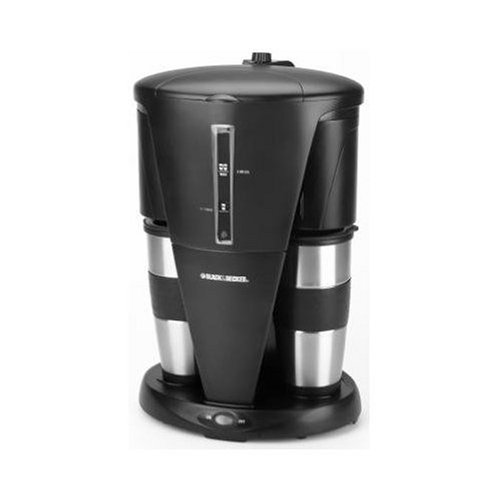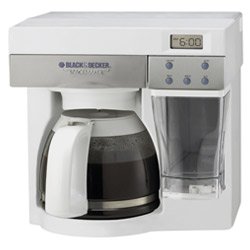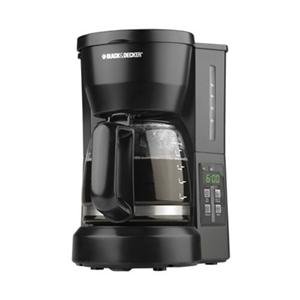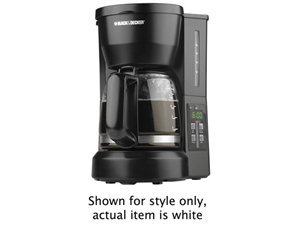 2 Pack, 16 OZ, Stainless Steel, Travel Coffeemaker, Mugs, Cone Filter.
2 Pack, 16 OZ, Stainless Steel, Travel Coffeemaker, Mugs, Cone Filter.Customer Review: Good enough
I just bought this item for $20. I thought since I only drink 1-2 cups a day, this would do and I could share if I had company. The coffee comes out steaming and the flavor is fine. It is easy to use, but the knob on the top does seem flimsy, so I followed someone else's suggestion and am keeping it on 2 cups and run water through to the 2nd cup. The cups are the problem in my opinion. They hold plenty of liquid and keep the coffee fairly warm for the duration, but the lid does not stay on very tight and whether you leave it on or take it off to drink, the lip of the rim is a little too wide and makes it difficult to drink without dribbling. I guess my suggestion would be to make the coffee and then pour into a better cup. Like I said, good enough for my purposes for the money.
Customer Review: Poor Quality
One of the mugs bases broke off within the first month of purchasing this coffee maker. And when I make two cups of coffee one mug only brews half of a cup and the other a full cup. Really strange. I contacted the company to complain to try to get a replacement but they never answered my email. I would skip this one and go for another brand.
Drinking water treatment systems have become quite popular after studies and the media have revealed the various contaminants that still exist even after plants have treated water. The EPA standards may not be enough to verify safe and healthy water which is why methods are used in homes to fully remove threats while keeping the good natural minerals.
Knowing the System
Water purification is the main goal of drinking water treatment systems which involves the removal of contaminants, harmful microorganisms and chemicals from a raw water source. Most water is purified for direct human consumption although there is also water produced for specific purposes with corresponding treatment profiles. Some of the methods include filtration, water softening, reverse osmosis, ultrafiltration, deionization, ultraviolet light and powdered activated carbon treatment.
Drinking water purification system can remove suspended particles of organic material, parasites, viruses, bacteria, algae, fungi, toxic metals like lead and copper and particulate sand. Some processes like reverse osmosis also take away beneficial minerals like magnesium and calcium. Elective purification is also available such as taste in mineral extraction, appearance in iron encapsulation and smell in hydrogen sulphide remediation. Simple procedures like activated carbon filters and boiling may not be sufficient to remove other potentially harmful materials.
Treat the Source
Systems should incorporate processes relative to the source of your water. Ground water is described as water coming from deep ground which may have fallen as rain several years ago. Soil and rock layers filter the ground water naturally before it is pumped to treatment plants. This source has high bacteriological quality and rich in dissolved solids like magnesium, carbonates and calcium. Iron and manganese may have to be reduced to improve the taste and quality.
Upland lakes and reservoirs are found in the headwaters of river systems usually above human habitation and protected by a surrounding zone. Bacteria, protozoa and algae is usually present and the water has low pH. Drinking water treatment systems should focus on adjusting these properties. Rivers, low land reservoirs and canals usually have plenty of bacteria, algae and suspended soils.
About Pre-Treatment
To better understand the right type of drinking water purification system that suits your needs, know how water is treated in purification plants. The pre-treatment process starts with pumping and containment wherein most of the water is pumped from its source or driven into holding tanks and pipes. The materials used for tanks, pumps and pipes should be selected well to prevent contamination. Next is the screening which removes large debris like trash, leaves, etc. Some sources like groundwater may skip this process.
Storage and Conditioning
After screening, the water may be stored in bankside reservoirs for a few days or several months allowing natural biological purification to occur. Storage reservoirs are also advantageous during drought and transitory pollution incidents. Pre-conditioning involves treatment of soda-ash or sodium carbonate to precipitate calcium carbonate for water rich in hardness salts. Pre-chlorination is done to prevent foul organisms from growing.
Other techniques may also be incorporated to take out fine solids, microorganisms, organic materials and inorganic substances. The method selected will depend on the type and quality of water, the costs of treatment as well as the quality standards expected. Ask for a water quality report in your area to assess which properties still need fixing then choose the right drinking water treatment systems that will improve the condition and state.
Do you want to learn more about drinking water treatment systems? Visit Truth About Water Filters - a popular site that provides consumers tips and more.
spacemaker coffee pot







